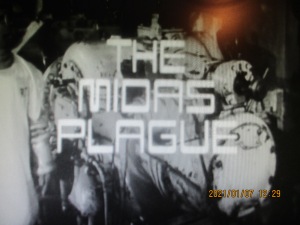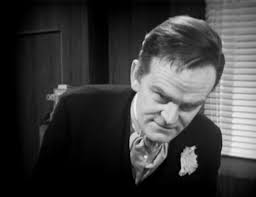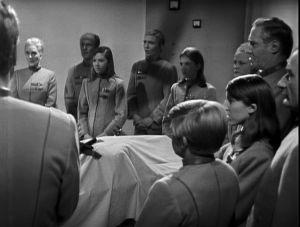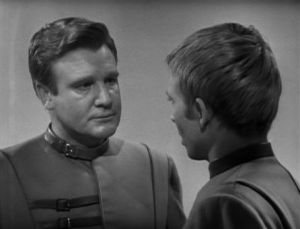“The Midas Plague” was broadcast by the BBC on 20th December 1965.
Cast: Morrey Anderson – Graham Stark, Edwina – Anne Lawson, Fred – Sam Kydd, Sir John – John Barron, Wainwright – Victor Brooks, Judge – A J Brown, Analyst- David Nettheim, Henry- Anthony Dawes, Gideon – Graham Lines and Revolution leader – David Blake Kelly.
Script: Troy Kennedy Martin. Director: Peter Sasdy. Producer and Story Editor: Irene Shubik
Special Sound: BBC Radiophonic Workshop. Incidental music: Max Harris.
 This episode is a comic satire on the consumer society. Based on a short story written by Frederick Pohl in 1954, it follows in the vein of his most well-known novel The Space Merchants (1952), also a satire on consumerism, which was set in a future in which advertising relentlessly sells pointless products to the public, including the idea of a colony on Venus.
This episode is a comic satire on the consumer society. Based on a short story written by Frederick Pohl in 1954, it follows in the vein of his most well-known novel The Space Merchants (1952), also a satire on consumerism, which was set in a future in which advertising relentlessly sells pointless products to the public, including the idea of a colony on Venus.
Pohl was clearly extrapolating from the post-war consumer society he saw developing in the USA, particularly through the advertising on television of the new consumer products pouring off the production lines and the creation of brand loyalty though the relentless repetition of slogans and images. (Vance Packard analysed this phenemenon in his influential book The Hidden Persuaders (1957).
The episode opens with shots of robots, very crudely made, accompanied by jaunty, humorous music, thus setting the tone of the episode. Our hero Morrey,, a radio economist by trade, has been summoned for a reprimand by his superior Wainwright after a report from the Ration Office. Morrey is Class 7 citizen and on his way up. “ It is your duty as a Class 7 consumer to consume the rations of consumer goods allocated by the state as befits your status.” Morrey pleads that he is doing his best and trying to consume everything he has been told to.
Wainwright explains that society is undergoing a severe economic crisis and that the public needs to “let out their belts, take their shoulders off the wheel, they have to eat more, drink more, drive more cars, wear out more clothes, and work less. This country is over producing, our automatic factories, our robots are making much too much of everything and it has to be consumed.” Morrey suggests that they should cut down production. “Then underprivileged citizens like myself wouldn’t have to eat and drink so much and live in such big houses and drive big cars and wear themeslves out enjoying themselves.”
Wainwright riposts: “How do you cut down production without destroying the whole system?” “By programming the robots to use up the good themselves,” counters Morrey, but Wainwrights is aghast: “This is heresy, the robots are made to work, not to have a good time.” Morrey suggests that they build the satisfaction circuits he is been working on into the robots, but this idea is not well received At the end of the interview he is told to work less and consume more and reminded: “Robots are here to serve you.”

Morrey and his robots
We accompany Morrey to his home where on arrival the robots do everything for him. The house is packed full of furniture with more being delivered. “But we haven’t worn out the other two yet,” he protests futilely. His wife Edwina is fed up and loses her her temper. Morrey admonishes her: “Not in front of the robots.” Things seem to be frosty in the bedroom as Edwina pleads: “Consume me, consume me little” but he says he does not have time.
A row ensues and Morrey escapes to the pub, complete with robot barman, gets drunk and burns his ration book. He is arrested by the robot police and appears in court before a judge (human, for once) who turns out to be his father-i-n law. He is reduced to class 10 which means working less and consuming more. Edwina leaves him with mountains of junk carted away in her cars, while to remedy his anti-social behaviour Morrey is sent to an analyst. who administers a truth drug. He decides that the root of Morrey problem is that he got a robot intead a puppy when he was a child and that subconsciously he hates robots. “You should love robots, they are there to please you, they do what you tell them to do and yet you hate them.” Angrily Morrey says that all his consumption is making him “more a machine than they are” and marches out to get drunk again

Fred, Morrey and Edwina
In a turning point in the story, when fleeing from the robot police after he tells the barman to pour some whiskey down the drain, Morrey is helped to escape by Fred who reveals himself to be be a member of a group of revolutionaries dedicated to overthrowing society. They ask Morrey to assassinate the Pime Minister, Sir John, tempting him with a vision of the future. “Once he is dead we will come to power, you will have mnay privileges. You will never have to consume again. Except a lightly boiled egg for breakfast, a grilled sole for lunch with salad, a litlle roast beef in the evening with half bottle of wine…And we let you work all week.” But he rejects their offer.
Back in court again before his father-in-law Morrey is now reduced to Class 12, backdated one year, and ordered to consume seven dozen cases of whisky in a fortnight. Edwina is deposited back home with all her luggage while more goods pour in to their house. Fred the revolutionary turns up again and reveals that he is a burglar, but a burglar with a difference, in this society he breaks into people’s houses and leaves more goods.

The robots having a great time
Together they break into the Ministry building and steal the “satisfaction circuits” and then implant them into Morrey’s robots. They now display very human characteristics ; over-eating, getting drunk and generally enjoying themselves smashing things up. Herded into the basement they rapidly consume or wear out all the goods allocated to Morrey in a comic filmed sequence.
Morrey is now hailed in the press for his outsranding consumer record. Wainwright pays him an unexpected visit but they manage to hide the robots in time. He tells Morrey: “You are going to be the biggest hero in the whole country. You are going to be given every honour. Sir John himself is very interested in you and I want you to come back and work for my department.” Morrey says he will consider it when he is less busy. As he leaves Wainwright offers him three days work if he returns.
Robot George consumes so hard that he blows up and is mourned by the other robots. When Morrey and Fred try to fix him they discover that is a special Mark 4 roobt opereated from a central control room in the Prime Minister’s office. They realise that Mark 4 robots are spying on the population.
Morrey is summoned to see the Prime Minister. who tells him , “All the world knows Mr Anderson that robots are our servants. They exist to serve us and make our life easy. They exist so that men do not have to work. This is the time of the Millenium. Man has only to consume and what has been his wildest dreams has come true. But a few men have become dissatisfied with this state of affairs. Jealous intefering rebels who have the cheek to say that man has become the slave of automation.”

Sir John
Sir John has a truth gun trained on him and Morrey is forced confesss to having met the rebels and agreeing with them. Suddenly he twigs that Sir John is a robot as well. He burst through a secret door and, pursued by police robots, he heads for the Master Switch (helpfully marked “Master Switch in large letters). When he throws this all the robots freeze, including Sir John and Wainwright. Edwina and her father arrive and so Fred and the revolutionaries having formed a provisional goverment (Fred is the Minister for Justice). The leader declares that Morrey is “the hero of the Revolution” and will be in charge of seeing that everyone gets less in the future. He also declare a national holiday “so that everyone can go and work“. Finnaly he declares that all robots will be done away with. But then the implications of this begin to sink in and they decide they need to keep Morrey’s robot Henry, as well bar tenders, policemen, street cleaners and a growing list of others. “Here we go again, ” says Morrey ruefully to camera.
With a good script, excellent cast and direction which supports the humour, this is a very enjoyable episode.





 This was broadcast on 18th October 1965.
This was broadcast on 18th October 1965.
